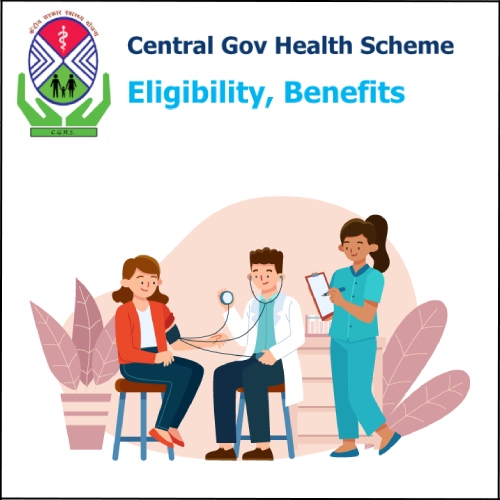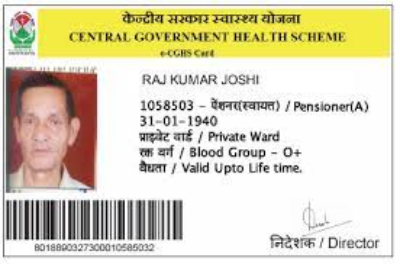Central Government Health Scheme (CGHS) – Eligibility, Benefits & Coverage
CGHS is the ‘Central Government Health Scheme’ which was launched in the year 1954. A lot of people use this scheme. It was initially launched for Central Government employees. The people who work for the Judiciary, legislature, executive, and press that is the employees of the four pillars of democracy. The main idea behind it was to take care of the people who work under these four categories.

In this article, we will be discussing who can buy this CGHS scheme, who can invest in it, and some more things about CGHS. So make sure that you read this article till the very end to gain complete knowledge about the CGHS scheme.
Facilities under CGHS Scheme
The CGHS facility is available to 42,00,00 beneficiaries in 80 cities. In these 80 cities, you will have to check which hospitals are approved for CGHS. There are two types which are planned and emergency. If your treatment type is planned then you will have to take approval from an authorized person of a dispensary for hospitalization, diagnostic test, or OPD consultation.
On the other hand, if it is an emergency then you can walk into the hospital and you will get a cashless treatment. Usually, there are rooms reserved for CGHS but if there aren’t any rooms available then they can deny you as well and then you will have to go to another hospital. Earlier for the AIIMS hospital, you had to do a reimbursement first. Hence it used to take a lot of time. This process used to take up to 30 days at least.
Cashless Treatment at 6 AIIMS
But now the good thing is at 6 locations in AIIMS you can get a cashless treatment under your CGHS card. The six centers are Bhopal, Bhubaneshwar, Patna, Jodhpur, Raipur and Rishikesh. This is really big news for all the CGHS holders. You might have a question that who comes under the family bracket. The family bracket includes the spouse of the government employee that fits in the eligibility criteria.

If both husband and wife are government employees then the CGHS will be according to the one who has a higher pay. It also includes parents, sisters, children, widowed daughters, and widowed sisters. CGHS facilities are given to them which is for a lifetime and there is no age limit for it as well.
CGHS scheme Eligibility Criteria
What does the CGHS scheme cover and eligibility criteria?
CGHS covers your OPD diagnostic test and hospitalization. So basically CGHS scheme covers overall your health care. There is also an eligibility criteria for the CGHS scheme. In total, there are 38 categories in which you can apply for the CGHS scheme. So people eligible under the CGHS health scheme are –
- All Central Government employees paid from the Central Civil Estimates (except Railways and Delhi Administration), including their families.
- Pensioners of Central Government (except pensioners belonging to Railways and the Armed Forces) and their families.
- Central Government Pensioners retiring with Contributory Provident Fund benefits and their families.
- Widows of Central Government pensioners, in receipt of family pension.
- Delhi Police personnel and their families, in Delhi only.
- Railway Board employees.
- Civilian employees of Defence are paid from Defence Service Estimates (except in Mumbai where the scheme is in operation).
- Child drawing pension on death of a Central Government employee including minor brothers and sisters of such child.
- Ex-Governors and Lt. Governors and their families.
- Ex-Vice Presidents and their families.
- Central Government servants who are deputed to semi-government and autonomous bodies receiving substantial grants from, or financed by the Central Government.
- Central Govt. employees on deputation to statutory/autonomous during the period of deputation.
- Military Officers while on deputation to civil departments and getting their emoluments from Central Civil Estimates.
- Families of Government servants transferred to a non-CGHS area, for a maximum period of six months on deposit of CGHS contribution (for the period of 6 months) in advance.
- Families of IAS Officers in the North-Eastern Cadre, who continue to stay back in Delhi even after repatriation of the AS Officer to the North-Eastern Cadre, provided that they continue to occupy Government accommodation in Delhi/New Delhi, on deposit of CGHS contribution in advance (one to three years). The same also applies to families of IAS Officers of J&K Cadre.
- Parliamentary Secretaries of the Central Government and their families.
- Members of Parliament and their families.
- Ex-Members of Parliament.
- Sitting Judges of the Supreme Court and High Court of Delhi and former Judges of Supreme Court and High Courts.
- Work Charged and Industrial Staff working in establishments run by various Ministries/Departments of Central Government, immediately from the date of their joining the service.
- Employees of Kendriya Vidyalaya Sangathan stationed at Delhi & NCR, Kolkata, Chennai, Hyderabad, Mumbai and Bengaluru.
- Employees of Ordnance Factory Board Headquarters, Kolkata and Ordnance Equipment Factories Headquarters, Kanpur.
- All India Service pensioners who retire while serving under the State at their option.
- Freedom Fighters and members of their families receive a Central Pension under the Swatantrata Sainik Samman Pension Scheme.
- Family members of the Deceased Ex-Members of Parliament.
- Pensioners of Ordnance factories.
- Members of Staff Side of the National Council of the Joint Consultative Machinery, even though not serving as Central Government employees.
- Persons employed in semi-government and autonomous bodies are permitted to join the CGHS Scheme.
- An Accredited Journalist who produces a certificate from the Press Council of India stating that he is a member of the Press Association, New Delhi (for OPD and at RML Hospital).
- Retired Divisional Accountants of the Indian Audit and Accounts Department and those whose pay and pension are entirely borne by the State governments.
- PSU absorbees who had commuted 100% of their pension and have been restored 1/3rd portion of their pension after 15 years.
- Employees of Statutory Bodies/Autonomous Bodies of Central Govt. (including those who proceeded on deputation initially or were on deemed deputation and then absorbed), who are in receipt of Central Civil Pension.
- Serving and retired Railway Audit Staff.
- Retired Divisional Accounts Officers and Divisional Accountants of the Office of Comptroller and Auditor General of India.
- CIS personnel (and their families) and CAPF (Central Armed Police Forces) personnel posted in CGHS cities.
- Employees of Supreme Court legal services committee.
- Employees of India Pharmacopoeia Commission and their families.
- Family and dependent members of the central government.
So these are the 38 categories who are eligible for the CGHS card. If you work in any of these categories then you can take the benefit of the CGHS card.

CGHS Card Application Process
The application process for the CGHS card is extremely simple and easy. You can go on the website and easily apply for it. The services offered are also at a very nominal price. A small part of your salary is given for this service which is CGHS. The maximum amount is Rs. 500 per month. There are different slabs according to your income. But whatever the amount is according to your income will be adjusted from your salary.
Once you retire you get an option to either pay this amount yearly or for 10 years at once. When you pay for 10 years at once it gets covered for your lifetime. You will not have to pay anything extra after this.
CGHS helpline
CGHS has an official helpline for people to reach out to them. This helpline is for 24 hours. So you can get in touch with them at any time. The CGHS helpline toll-free number is 18002088900. This service is available in two languages, English and Hindi. The beneficiaries can seek help through this number at any time. There is also an official website of CGHS. The link is mentioned here.
Should you get any other health insurance in spite of being a CGHS holder?
Now many people wonder if they should get one more health insurance policy. The CGHS holders already have great health coverage. In the coming time, the problem of reimbursement will also be solved. In the coming time, the process will become extremely smooth. They will also tie up with many more great hospitals.
But along with this, you can also take personal health insurance as well. So that in case of emergency, you will not have to think about anything and you can get treatment as soon as possible.
So we have now covered everything related to CGHS health care. We hope that you found this article helpful and if you did do not forget to share this article with your friends and family so that even they can benefit from it.
